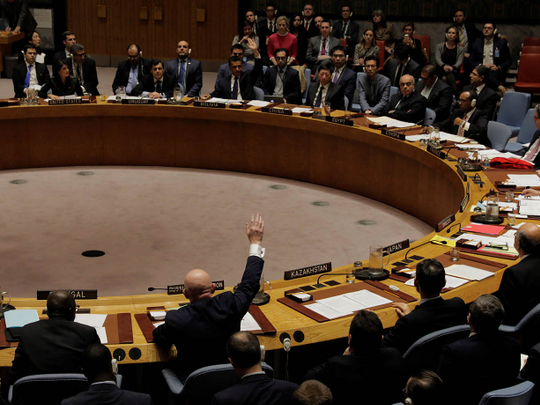
United Nations: Russia on Thursday cast its veto at the UN Security Council to block the extension of a UN-led investigation to determine who is behind chemical weapons attacks in Syria.
It was the tenth time that Russia has used its veto power to stop council action that targeted its ally Syria.
Russia and the United States had put forward rival draft resolutions on renewing for a year the mandate of the Joint Investigative Mechanism (JIM), tasked with identifying the perpetrators of chemical attacks.
After Moscow vetoed the US draft resolution, the Russian-drafted measure failed to garner the nine votes required for adoption.
Addressing the council, US Ambassador Nikki Haley assailed the veto as a “deep blow”, saying “Russia has killed the investigative mechanism which has overwhelming support of this council.”
“By eliminating our ability to identify the attackers, Russia has undermined our ability to deter future attacks.”
“The message to anyone listening is clear: in effect, Russia accepts the use of chemical weapons in Syria,” she said.
A resolution requires nine votes to be adopted at the council, but five countries — Russia, Britain, China, France and the United States — can block adoption with their veto power.
Fundamental flaws
Russia has sharply criticized the JIM after its latest report blamed the Syrian air force for a sarin gas attack on the opposition-held village of Khan Sheikhun that left scores dead.
The attack on April 4 triggered global outrage as images of dying children were shown worldwide, prompting the United States to launch missile strikes on a Syrian air base a few days later.
Syria has denied using chemical weapons, with strong backing from Russia.
Russian Ambassador Vassily Nebenzia said the investigation of the Khan Sheikhun attack suffered from “fundamental flaws” and he again questioned the findings of the report.
The US measure, he argued, was “geared toward entrenching the inherent flaws of the JIM” and would not have improved the panel’s work.
In its draft, Russia had insisted that the panel’s findings on Khan Sheikhun be put aside to allow for another “full-scale and high-quality investigation” by the JIM.
The Russian veto came as the United Nations was preparing to convene in Geneva on November 28 a new round of talks to end the six-year war and underscored deep divisions over Syria.
Despite the veto, several countries such as Kazakhstan and Ethiopia appealed for another last-ditch effort to save the investigative panel. Its mandate ends at midnight Thursday.
Eleven of the council’s 15 members voted in favour of the US-drafted resolution, while Egypt and China abstained. Bolivia joined Russia in voting against the measure.
Russia, China, Bolivia and Kazakhstan voted in favour of the Russian draft, while seven countries opposed it. Four countries abstained: Ethiopia, Senegal, Egypt and Japan.
French Ambassador Francois Delattre said the Russian veto was a blow to international efforts to curb the use of chemical weapons.
“Let there be no doubt: we have unleashed a monster here,” said Delattre.
The joint UN-Organisation for the Prohibition of Chemical Weapons (OPCW) panel was set up by Russia and the United States in 2015 and unanimously endorsed by the council, which renewed its mandate last year.
Previous reports by the JIM have found that Syrian government forces were responsible for chlorine attacks on three villages in 2014 and 2015, and that Daesh used mustard gas in 2015.












